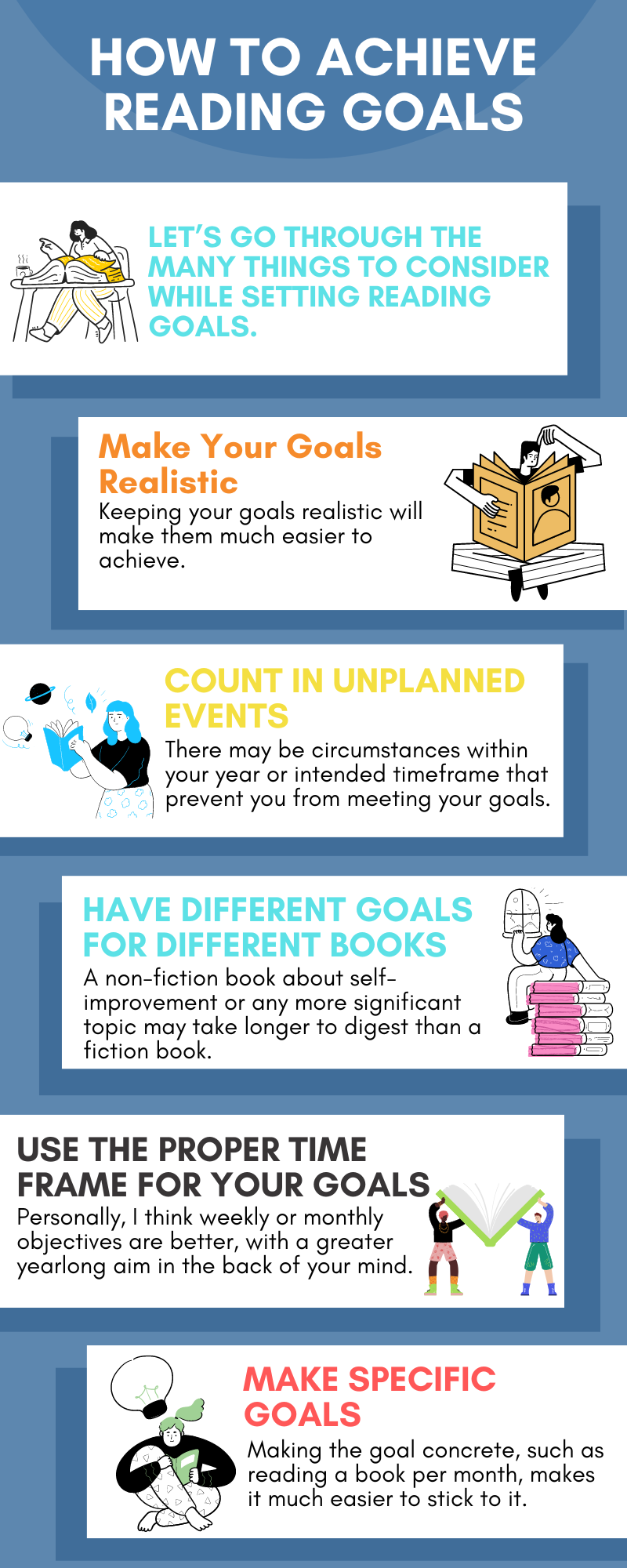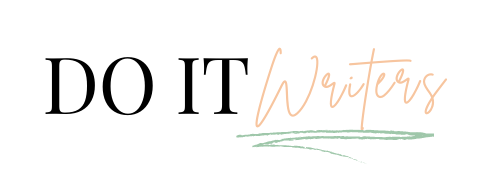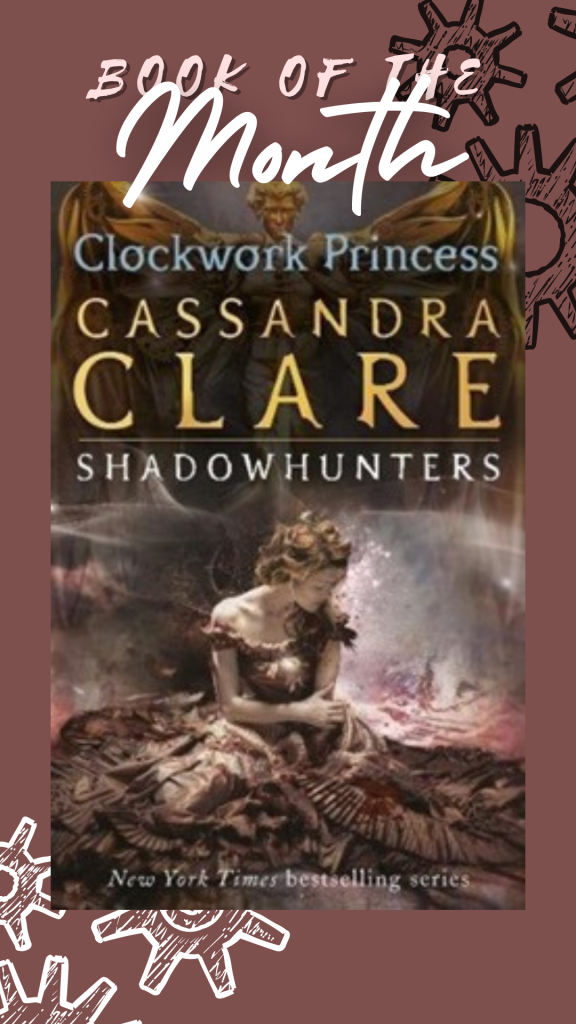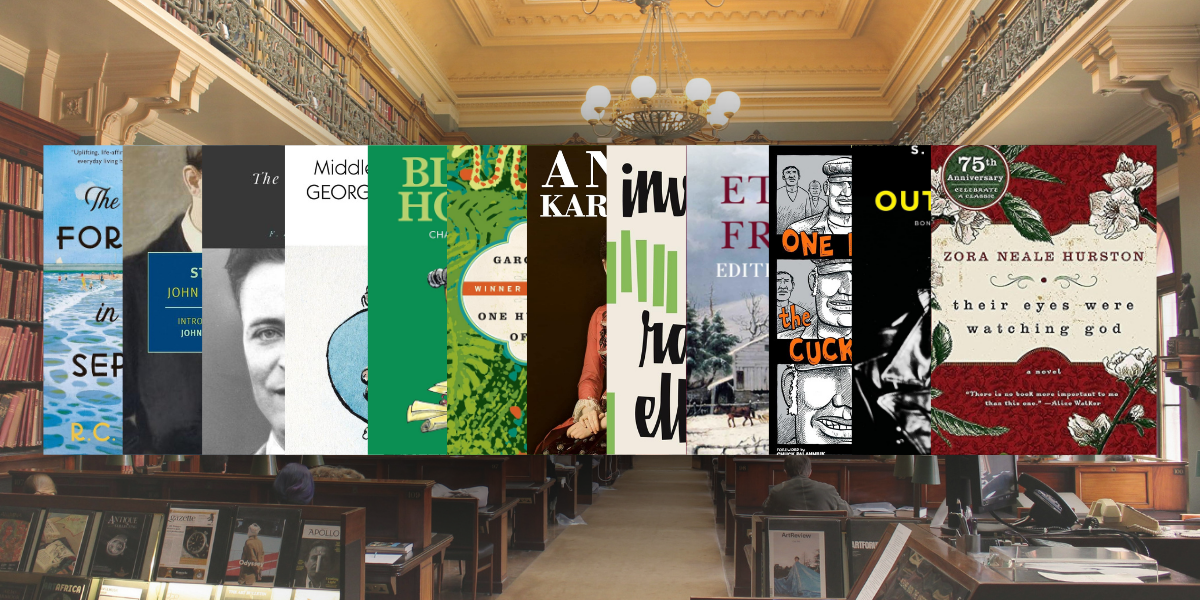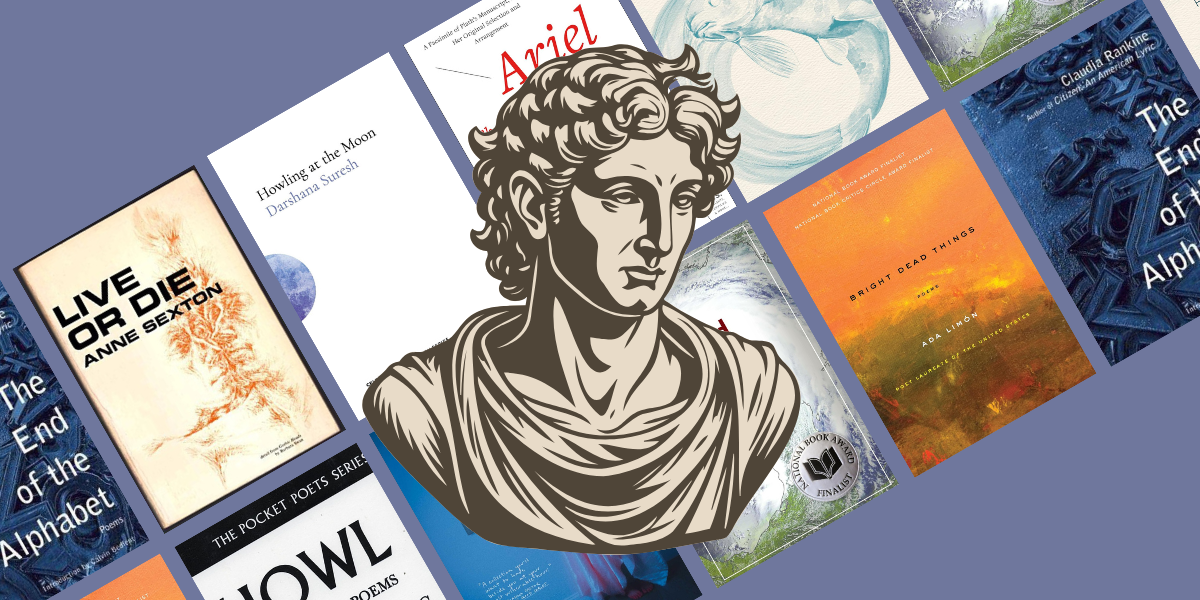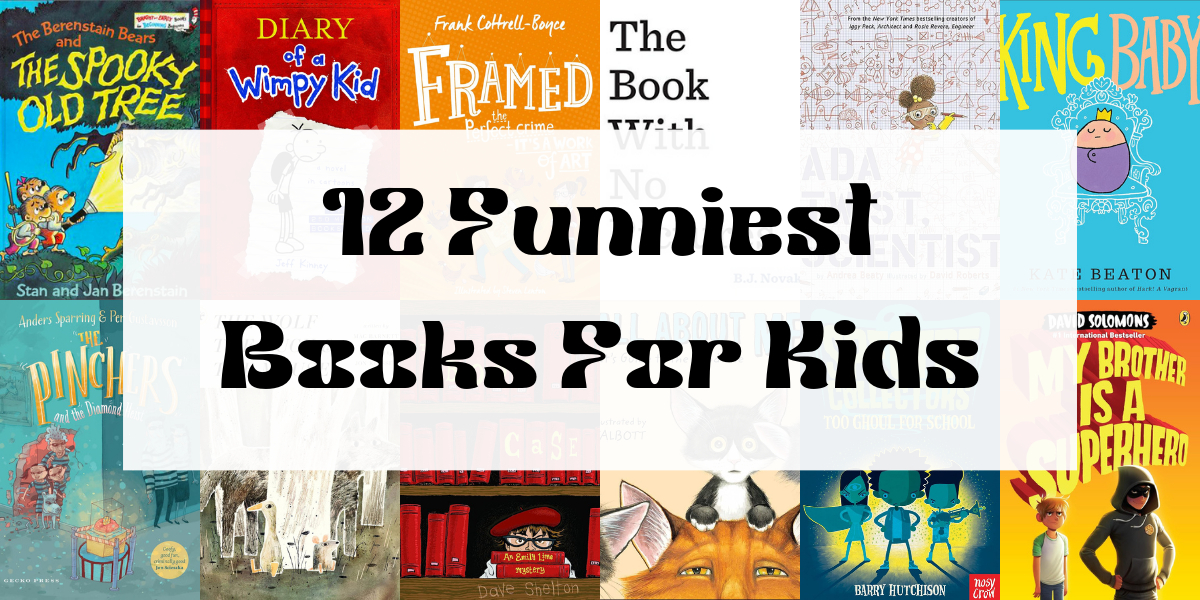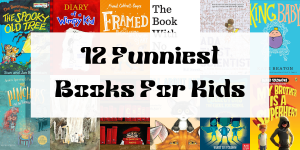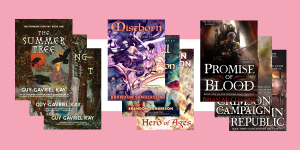Many of us may be thinking about making goals for 2023 as we enter the New Year.
A lot may happen in a year, so it’s critical to develop achievable goals to help us succeed.
Setting reading objectives is a difficult endeavour. Having overly ambitious ambitions may prohibit you from ever starting. So, how can you set good, attainable reading objectives?
When it comes to reading goals, it’s critical to keep things in perspective. It is also true that unanticipated events may occur, therefore setting goals on a weekly or monthly basis rather than daily will help you reach them.
In this blog post, we’ll go through how to make objectives for 2023 and offer advice on how to keep on track during the year.
What Are Reading Goals?
Reading objectives are objectives related to the act of reading. It is not, however, restricted to the number of books read, the amount of time spent reading, and other measurable reading goals.
A reading goal can be as easy as chronicling your reads on a bookstagram or book blog, or it can be as complex as taking actionable efforts to encourage further reading, such as joining a book club and making friends with new readers.
Why Would You Want To Set A Reading Goal?
Why are reading objectives important? If you don’t set a goal, you won’t know where you’re going or what you want to achieve with your reading. Having a reading goal in mind and a plan to achieve it will help you achieve it more easily.
How To Achieve Reading Goals

With that out of the way, let’s go through the many things to consider while setting reading goals.
1. Make your goals realistic
Keeping your goals realistic will make them much easier to achieve. Setting a goal of reading 100 books next year and having never done it before will be a lot of work. That’s nearly two books per week. A book a month would be far more practical for someone who is just getting started with reading.
It is also true that books vary in length. One could have 200 pages with large type, whereas the other could have 500 pages with significantly higher word density.
There are numerous approaches to setting reading objectives. You could set objectives based on:
- Books read
- Pages read
- Time spent reading
Whatever suits you best. My personal objective is to read two books per month. If the book is very long, say more than 500 pages, I might read only one a month. I don’t have much time to read, despite the fact that I enjoy it and find it useful.
There are also variances in how quickly you can assimilate books. When reading a non-fiction book, you may want to spend more time assimilating the content than when reading a fiction book.
2. Count in unplanned events
There may be circumstances within your year or intended timeframe that prevent you from meeting your goals. As a result, if your yearly aim was to read a book a month, don’t be too hard on yourself if you only managed to read ten novels.
Having a monthly goal of reading a book will keep you on track. However, unanticipated occurrences sometimes prohibit you from reading as much as you would like. For example, if something essential has arisen or you have grown busier, you may not have much time to read.
You might also choose shorter novels for such occasions if you know they are ahead of you. Just so you know, if you have daily goals, some days you simply don’t have the time to read. As a result, I prefer weekly or monthly goals to daily goals.
3. Have different goals for different kinds of books
As previously said, a non-fiction book about self-improvement or any more significant topic may take longer to digest than a fiction book.
As a result, if you enjoy reading both fiction and nonfiction books, setting individual goals for each category could be considered. For example, if your objective was to read 100 pages of fiction per week, you could substitute 50 pages of nonfiction.
If you don’t assimilate what you read when it comes to achieving your goals, the reading won’t be as effective as it may be. If you can’t remember what you read, speed-reading isn’t always the greatest option.
Read more: These 10 Books Don’t Get Talked About Enough
4. Use the proper time frame for your goals

When selecting reading goals, you may choose from a variety of timeframes.
These are examples:
- Daily
- Weekly
- Monthly
- Yearly
Personally, I think weekly or monthly objectives are better, with a greater yearlong aim in the back of your mind. Trying to read one book every month, with a yearly goal of ten, would allow enough time to read each book while also leaving room for unanticipated events. Even if one month’s book is skipped or takes longer than expected, the yearly goal is still attainable.
With simply an annual goal, you may find it too simple to say, “I’ll just take the time by the end of the year and read those other books in December.” We all know how well that generally works out.
As a result, I prefer monthly targets with a yearlong goal in the backdrop.
Daily goals, in my opinion, are likewise inadequate. You will almost certainly have days when you simply cannot find the time to read. This would be discouraging and make sticking to your goals more challenging.
Read more: 10 Proven Tips To Read Books Faster
5. Make specific goals
Making the goal concrete, such as reading a book per month, makes it much easier to stick to it. Having vague objectives like “I want to read more books,” which do not specify how many or when will make it much simpler to forget.
When you have a book for each month, you know exactly how much reading you should complete in that month. If you don’t take action, the sentence “I want to read more” means nothing. Everyone wants to be more fit, have more money, and so on.
However, if you don’t have a specific goal to work toward, it’s much less likely that you’ll achieve those goals. Another thing to remember is to keep things in perspective for YOU. People read differently depending on their life circumstances. Some people can read a book every week, while others can only find the time and focus to read a book once a month.
Easy Reading Goals For Adults

What are some reading goals for grownups? These simple and realistic Reading goals for struggling readers, such as busy adults, will greatly assist you in making reading less of a hassle.
1. Read More Frequently
The most common reading goal for adults is the straightforward objective of reading a certain quantity of books. This is the core idea behind the Goodreads Challenge. You declare that you wish to read your choice number of books this year and then keep track of your progress.
Set a goal of reading more regularly rather than more books.
Putting pressure on yourself as an adult to read more books may discourage you from reading when life gets in the way.
Increasing your reading frequency will eventually lead to you reading more books. However, it is simpler to make a goal like “read 20 minutes a day” rather than “read 2 books a month.”
Breaking down your reading goals into daily doable chores will assist, so consider making a goal to read more often!
2. Read More Genres
Do you tend to limit your reading to your favourite genres? Perhaps you’ve read every John Grisham thriller but have never read nonfiction. Or you’re stuck in the past and should branch out – or vice versa.
Joining a Reading Challenge that requires you to check off different categories is one of the best adult reading objectives. Then you’re forced to broaden your reading tastes, and you might discover you enjoy true crime novels or World War II historical fiction.
Read more: Awesome Benefits Of Reading Books Of Different Genres
3. Spend More Time Reading
A terrific reading goal for adults is to spend more time reading rather than a certain amount or sort of books to read.
You may make a goal to read for 30 minutes every day, just as you did when you were a youngster. Maybe you read the best right before bed or first thing in the morning. Lunchtime, or while waiting in line for the carpool.
Keeping a consistent reading schedule, regardless of the time limit you establish, is a fantastic reading goal for adults who struggle to find time to read. Squeezing in 20 minutes will be difficult on some days, but on others, I guarantee you’ll find yourself adjusting your priorities to include far more reading time.
Setting a reading goal based on time is also ideal for persons who enjoy reading slowly and deeply. We sometimes lose sight of the deeper themes presented by the author in our desire to read more and more books. Slowing down your reading to reduce the amount of books read but enhance the contemplation of those books can bring amazing calm in our fast-paced world.

4. Join A Book Club
Not all adult reading objectives must focus on reading challenges, whether by category, time, or books read. Why not join a book club this year?
Although reading is typically a lonely activity, a book club brings together like-minded individuals. What reader doesn’t enjoy discussing the book they just finished, praising its qualities, and laughing at its flaws?
If you aren’t already a member of one, go out and find one.
Can’t seem to find one? Look on the internet. Even better, start your own. Simply pick a few agreeable people and establish some ground rules.
5. Attend A Book Event/Launch
If you’ve never attended a book event, such as a book fair or a book launch at a bookstore, you could make it a goal to attend at least one book-related event this year.
Here are some pointers for discovering these book events:
- Follow the Instagram accounts of local bookstores.
- On social media, follow local or favourite authors.
- Sign up for book-related newsletters.
6. Keep A Reading Journal
Whether you try one of the other adult reading objectives or not, keep a reading journal. Putting pen to paper and recording your thoughts is one of the most enjoyable methods to keep track of your reading.
Your reading log might be as simple as a list of books you’ve read or as sophisticated as a full assessment of each story’s narrative, quotes, and insights. Use an old notebook or get a beautiful journal to keep track of your reading list.
7. Listen To Audiobooks
Listening to audiobooks to read more books is an excellent reading goal for a busy adult.
We must be honest with ourselves; if we do not have the time to read physical books, we can experiment with other methods of incorporating reading into our hectic schedules.
Reading audiobooks is convenient because you can listen to them while driving to work, doing chores, going to the gym, and doing other activities.
Read more: 11 Free And Interesting Audiobooks To Listen To At The Gym
8. Declutter Your Books
Don’t blame me for simply stating the obvious: most individuals own far more books than they should. To each their own, I’m not going to tell you how many books you should own.
However, if you check through your bookshelves, you will most likely find books that you do not need. Books on fad diets. Books are given to you by others that you do not want to read. You read a book and then either despised it or felt okay about it.
If you enjoy having books on display, keep doing so.
How To Achieve Your Reading Goals If You Don’t Have Time

It is critical to plan for action because we frequently plan things but never do them.
Carry A Book With You Everywhere
Put a book in your work bag, tote bag, or grocery bag and choose to read it instead of staring at your phone; this will help you read more.
Try Different Reading Formats
Some of us simply do not have the time or access to physical books; if reading on a kindle or listening to an audiobook helps you, by all means do so!
Create A Reading Corner
Creating a special reading area in your house can be extremely beneficial while attempting to meet your reading objectives.
Avoid reading in places where you will be distracted, such as in front of the TV, at your job station, or in an extremely loud cafe (unless you prefer cafes).
Reward Yourself
One of the laws of habit formation would be to “make it satisfying.” You must make the experience of finishing something satisfying in order to reinforce the behaviours you perform in relation to your reading goals.
Associating something nice and gratifying with something tough will help you reach your reading goal more quickly!
Read more: 8 Ways To Read 100 Books In A Year
